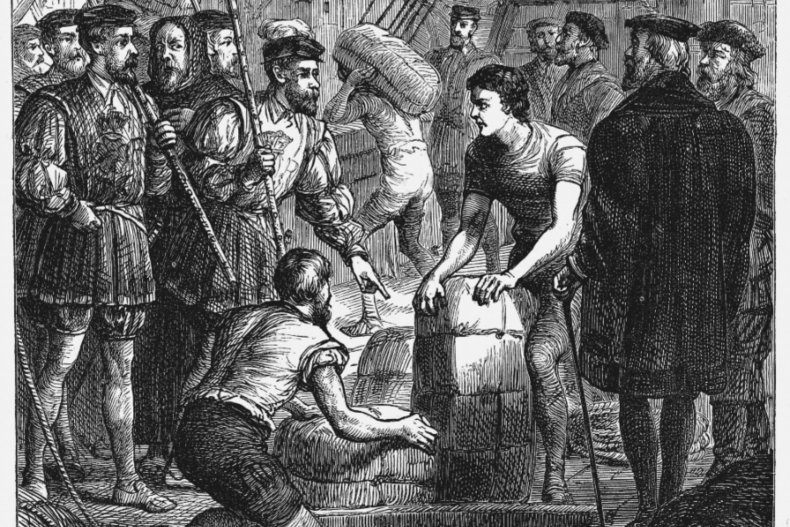[ad_1]
A man has revealed the curious smugglers’ windows inside his 500-year-old house, nestled along a medieval street.
The homeowner, who lives in a town called Steyning, in England, gave viewers a mini-tour of his home, with its thatched roof, and he pointed out the architectural oddity.
He shared a clip to his TikTok page, @Sussexsaxon, as he talked people through the historical relic still in his current home.
He said: “More historical curiosities in my 500-year-old cottage. If we go through this door here, into the eave of the roof from the master bedroom, you’ll see this tiny little window which has been boarded up. But why would I need such a small window?
“Well I’m not the only one to have one of these tiny little windows. If we look out from my bedroom here, you’ll see the house opposite also has one of these tiny little windows.
“In fact you’ll find one of these windows every few houses along this medieval street. And quite often people will just walk past and not even notice.
“But what would be the purpose of a window this small, and in such a place. To know that you have to go back a few hundred years, to the time of smuggling.
“The river Adur here used to run a different course, and there was a harbor in Steyning. Smugglers would land their contraband here, and walk up streets like this, to sell their rum, tobacco, tea and other contraband.
“But where there are smugglers, there are often customs men. So the smugglers needed to know if it was safe to ply their goods without being caught by the customs men. So locals would light a candle and put it in their smugglers window.”
While the boarded-up window is still visible inside, he walked outside his home to reveal the exterior had been obscured.
“Unfortunately a couple hundred years ago an extension was built which blocked where my smuggler’s window is, mine would have been the other side of this chimney breast here, as there was an alleyway which ran down the side of the house, which was very useful for smugglers. So it was to alert the smugglers that the coast was clear,” he added.
One if by land. Two if by sea. Three to buy tea
Paul C. Jeffries
In the comments he admitted that while officials knew the purpose of the windows “ultimately it was still just a window and the authorities were powerless to stop it.”
And explaining why a separate, smaller, window was needed for the purpose, he wrote in the comments: “Because back then, people used candles for lighting anyway so having a specific smugglers window with a candle left no room for ambiguity.”
Posted to the site on Monday, the clip has been seen more than 600,000 times, and can be seen here, as people were in awe of the rich history of the area.
Clif LaPach remarked: “I find it amazing that there is a 500-year-old man made structure that’s still liveable.”
Borah Beau’s Pet _ Farm pointed out: “We had one. Hidden room. Used in the Underground Railroad.”
Folksonomies_gone_awry joked: “I would have assumed it was a place for ghost children to look upon the road.”
Lax Loafer said: “It’s actually a one way cat flap.”
Fernfernferns raved: “I never knew that’s what they were for! That’s so cool.”
Dar Adams commented: “This is fascinating to me, an American. Thank you!”
And referencing another famous moment in history using a candle in a window, Paul C. Jeffries added: “One if by land. Two if by sea. Three to buy tea.”
Famous Poem
His comment refers to a line from the poem by Henry W. Longfellow, named Paul Revere’s Ride, and refers to the events that unfolded in 1775 on the eve of the American Revolutionary War.
Revere set up the signal system using lanterns in the Old North Church, as a warning over the route British troops were taking as they traveled to Concord, website Paul Revere Heritage explained.
Smuggling was rife in England a few centuries ago—particularly in the 18th century as the war overseas raged—with sailors resorting to stashing goods in caves dotted along the coast, which tourists can still visit today.
Website Smuggling.co.uk says: “What had previously been simple small-scale evasion of duty turned into an industry of astonishing proportions, siphoning money abroad, and channeling huge volumes of contraband into the southern counties of England.”
Newsweek reached out to @Sussexsaxon for comment.

Photos.com/Getty Images
[ad_2]
Source link
